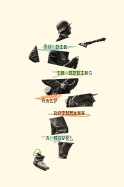
Much has been written about the atrocities of World War II from the Allied perspective, but rare are the accounts of those suffered by the Germans themselves. German author and poet Ralf Rothmann's fourth book in English depicts the haunting experiences of a conflicted German soldier as he grapples with life-altering decisions at the end of World War II.
As Walter Urban is dying of cancer, his son reflects on their difficult relationship. The son offers a blank notebook in which to record memories, but Walter dies before writing anything, leaving his son to piece together the events of his life during the war. As a 17-year-old milkman, Walter and his best friend Friedrich (Fiete) Caroli are drafted into a depleted German army. After basic training, Walter serves as a supply driver while Fiete is sent to the front against the approaching Red Army. Walter's post allows him to observe the brutality of war from the periphery. This changes when he witnesses the murder of innocent villagers by German officers and the inevitable life-altering choices he faces upon Fiete's desertion.
Rothmann (Young Light) does a wonderful job contrasting the challenges to Walter's integrity with the treachery of the more experienced officers. The scenes are harrowing--villagers bursting into flames after a phosphorous attack by enemy forces, bodies of deserters dangling in tree limbs--and Rothmann leaves no details unturned. He describes the anguish of the German people in the waning days of war and its enduring legacy on future generations: "If you're mentally or physically injured it does something to the next generation. The insults, the blows or the bullets that hit you also injure your unborn child."
To Die in Spring is an important addition to the formidable canon of World War II literature. --Nancy Powell, freelance writer and technical consultant

